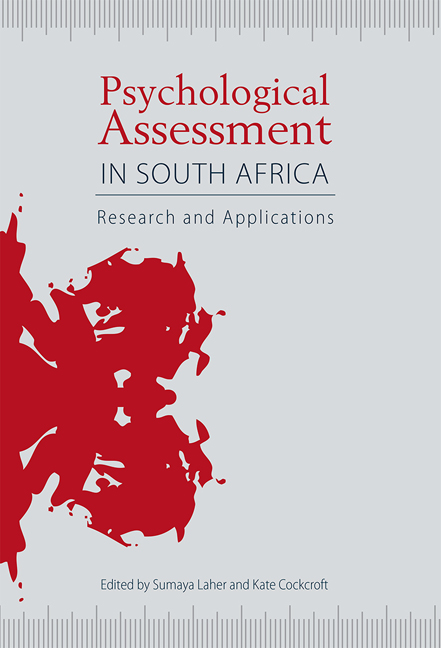Book contents
- Frontmatter
- Contents
- Tables and figures
- Acknowledgements
- Acronyms and abbreviations
- 1 Contextualising psychological assessment in South Africa
- Section One Cognitive tests: conceptual and practical applications
- Section Two Personality and projective tests: conceptual and practical applications
- Section Three Assessment approaches and methodologies
- 28 Ethical perspectives in assessment
- 29 Using computerised and internet-based testing in South Africa
- 30 The ImPACT neurocognitive screening test: a survey of South African research including current and projected applications
- 31 A family consultation model of child assessment
- 32 Qualitative career assessment in South Africa
- 33 Psychological assessment and workplace transformation in South Africa: a review of the research literature
- 34 Assessment of prior learning: a South African perspective
- 35 Large-scale assessment studies in South Africa: trends in reporting results to schools
- 36 Current and future trends in psychological assessment in South Africa: challenges and opportunities
- Contributors
- Index
36 - Current and future trends in psychological assessment in South Africa: challenges and opportunities
from Section Three - Assessment approaches and methodologies
Published online by Cambridge University Press: 21 April 2018
- Frontmatter
- Contents
- Tables and figures
- Acknowledgements
- Acronyms and abbreviations
- 1 Contextualising psychological assessment in South Africa
- Section One Cognitive tests: conceptual and practical applications
- Section Two Personality and projective tests: conceptual and practical applications
- Section Three Assessment approaches and methodologies
- 28 Ethical perspectives in assessment
- 29 Using computerised and internet-based testing in South Africa
- 30 The ImPACT neurocognitive screening test: a survey of South African research including current and projected applications
- 31 A family consultation model of child assessment
- 32 Qualitative career assessment in South Africa
- 33 Psychological assessment and workplace transformation in South Africa: a review of the research literature
- 34 Assessment of prior learning: a South African perspective
- 35 Large-scale assessment studies in South Africa: trends in reporting results to schools
- 36 Current and future trends in psychological assessment in South Africa: challenges and opportunities
- Contributors
- Index
Summary
In the last 20 years, with the advent of a new democratic political dispensation, the field of psychological assessment in South Africa has developed in many ways. Most notable have been the influx of international tests and the Employment Equity Act (No. 55 of 1998). This Act was specifically promulgated to recognise that as a result of apartheid and other discriminatory laws and practices, there are disparities in employment, occupation and income in the labour market which have created such pronounced disadvantages for certain categories of people that they cannot be addressed by simply repealing discriminatory laws. Hence, the Employment Equity Act proposes a number of actions, the most prominent being that of affirmative action, to address the broader inequalities that exist in the workplace in South Africa. The Act also states that all psychological instruments used on South Africans should be reliable, valid, unbiased and fair for all groups in the country. This is a novel approach to legislation, since internationally the governance of psychological testing generally falls under the auspices of the psychological registration bodies. The promulgation of this legislation has led to increased ‘conscientisation’ of researchers, practitioners and the public. As a consequence, validation studies of the types discussed by Milner, Donald and Thatcher in chapter 33 of this volume have been undertaken. A number of private companies and institutions have also started using only those tests that are supported by a solid body of empirical research. However, a number of challenges remain. Rather than viewing each as an insurmountable obstacle, we attempt in this chapter to present them as challenges to be overcome, each giving rise to a unique set of opportunities.
Policy implications of the Employment Equity Act
Although the majority of practitioners are using tests ethically and responsibly, there is no active control mechanism to manage this effectively. The Health Professions Council of South Africa (HPCSA) has a Psychometrics Committee under the Professional Board for Psychology. The Psychometrics Committee has a mandate to evaluate tests to determine whether they are reliable, valid and fair before registering them for use in the country.
- Type
- Chapter
- Information
- Psychological Assessment in South AfricaResearch and Applications, pp. 535 - 552Publisher: Wits University PressPrint publication year: 2013



